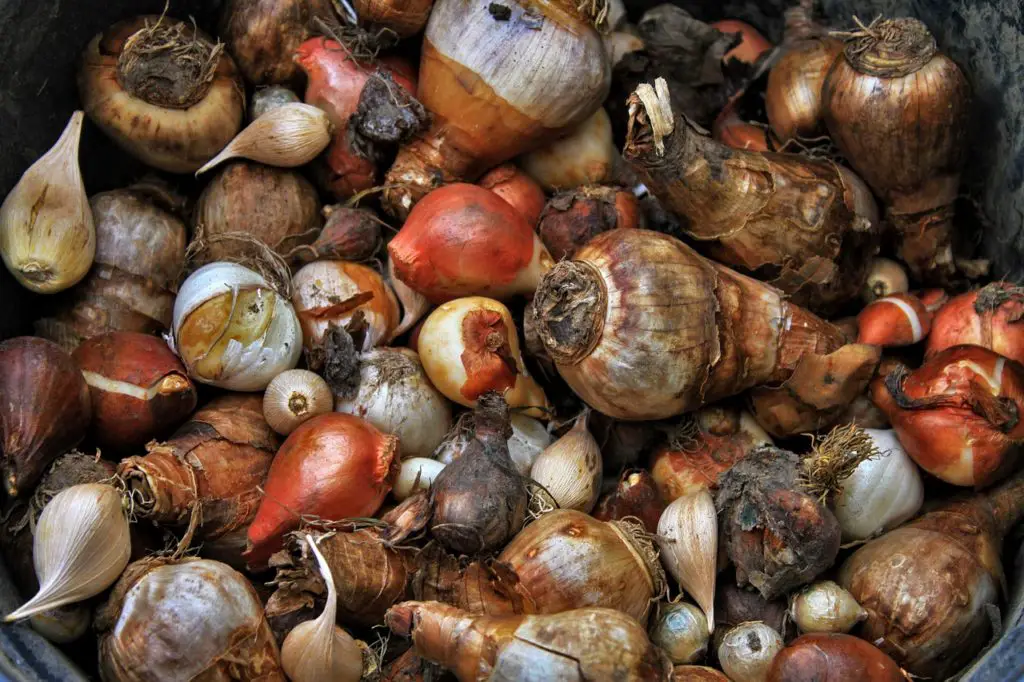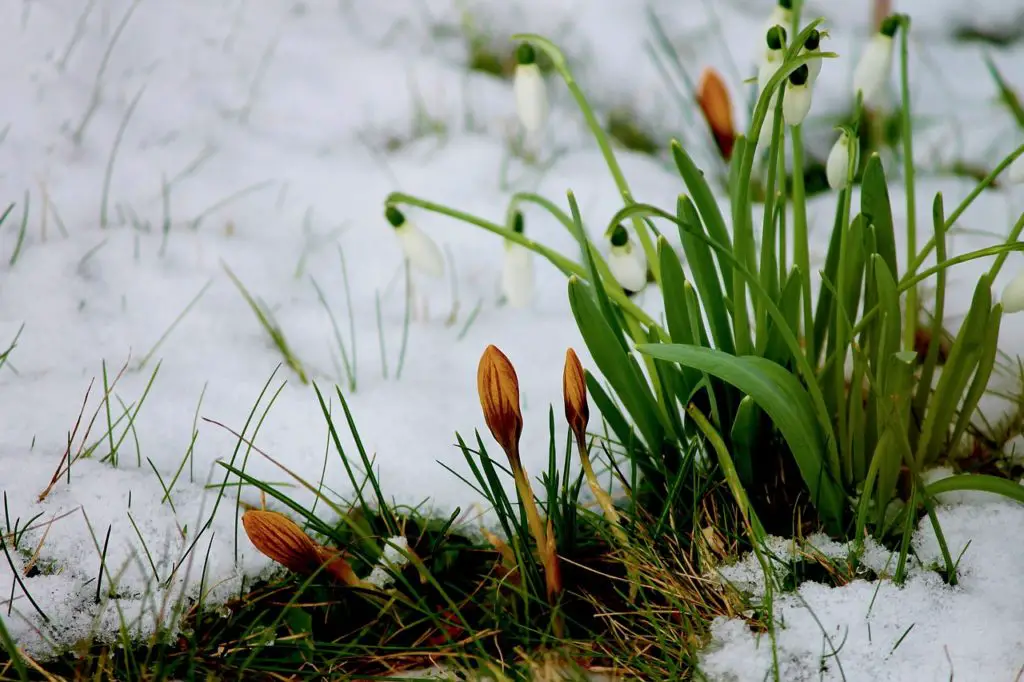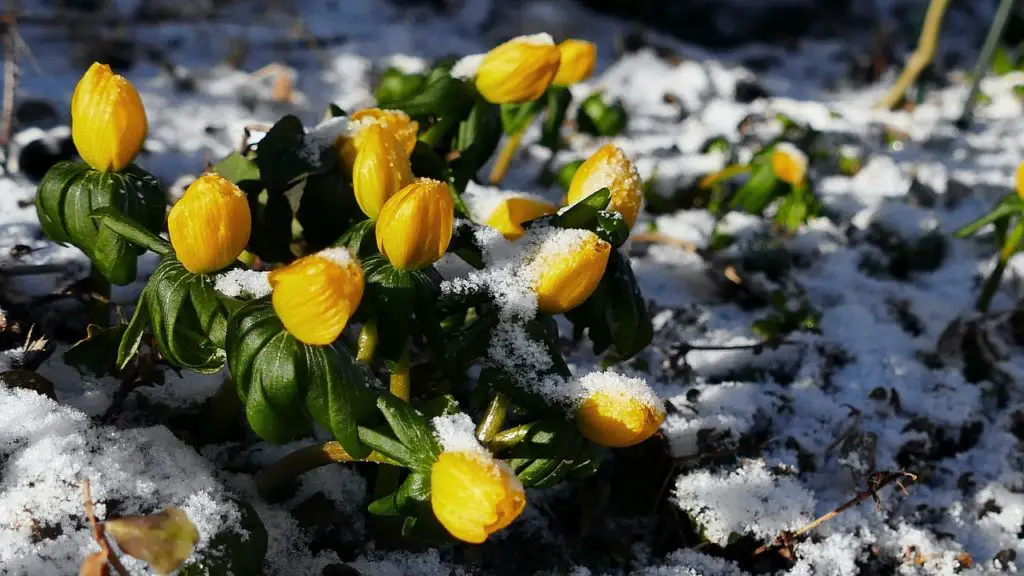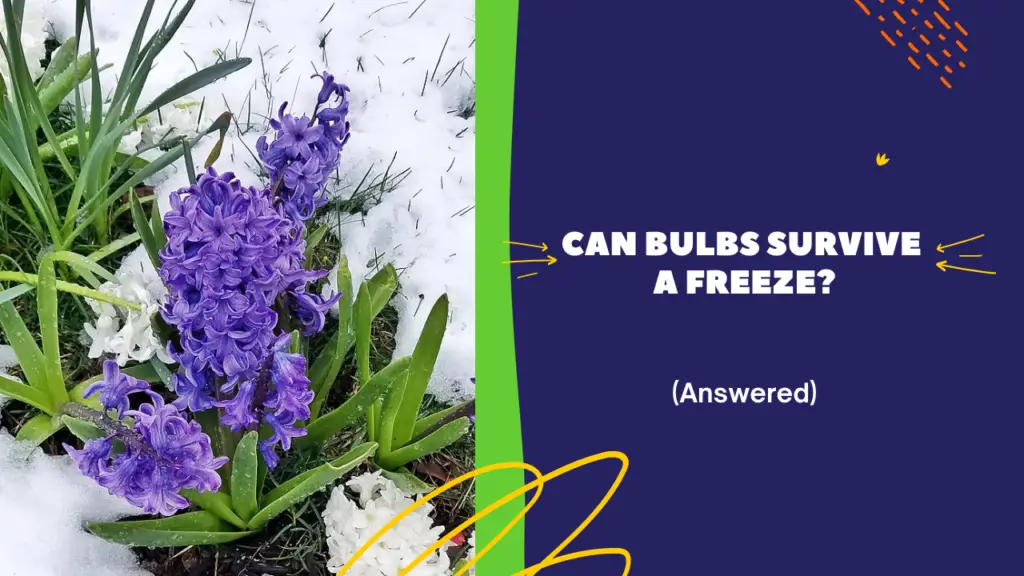You’ve planted your bulbs and the temperatures are cooler, but then there is a warm snap and you see leaves start popping up through the ground. Eventually, those freezing temperatures have returned and like all gardeners you will begin to wonder whether those bulbs you planted will be ruined. Can bulbs survive a freeze? The Grow Monster has experienced this many times living in zone 7. Let’s take a look at what happens when the leaves pop through and if the frozen temperatures will harm your bulbs.
Can bulbs survive a freeze? Bulbs can survive a freeze if they have already established root systems. Bulbs turn starches to sugar as the temperatures cool acting as a type of anti-freeze.

Even when the ground is frozen the bulbs are able to regulate their sugar content to help stop themselves from freezing. Different bulbs have different requirements, but as long as you are able to get an established root system going before a hard freeze, your bulbs have a better chance of survival. Read on to learn how to help your bulbs be best protected against freezing temperatures.
Can You Plant Bulbs Right Before a Freeze?
Ideally, you will plant your bulbs before threat of a hard freeze happens. But, the best laid plans and all- so can you plant bulbs right before a freeze? You will want to give your bulbs enough time to establish roots, which may not happen if there is a hard freeze right around the corner. Some bulbs, like the Calla Lily rhizome must be planted after all threat of frost is gone. You will want to make sure that you know which type of bulb you have before you plant. Check out our bulb posts to learn more about each type.
By planting bulbs before a freeze, you will give them adequate time to grow and establish a root system. This root system is very important to keep the plant alive throughout the Winter and anchor the plant during the Spring blooming season. Plants that do not have an established root system are known to have shorter stems, flower later if at all, and less robust blooms if they do flower according to studies. It is best to give the plants enough time to develop root systems before the ground would be frozen in your zone.
If you haven’t planted your bulbs and there is a freeze coming within a few days, you can still plant them but plant the bulbs deeper and put mulch over the top to help keep the soil temperatures warmer compared to the above ground air, especially if you are going to be receiving only a day or two of freezing. If you will be heading in to the long freezing part of winter for your zone then you may want to just plant your bulbs in pots and keep them in the garage or a basement or even put the bulbs in the fridge until the freezing temperatures are over in your area.
Can Bulbs Survive a Freeze?
You finally get those bulbs planted and then right before you know it there is a hard freeze. You may begin to wonder can bulbs survive a freeze? Bulbs can survive a freeze if they have adequate roots and enough time to convert the starches to sugars. However, some bulbs are tropical and will not be able to survive so they must be planted after all threat of frost is gone. It is important to note which type you are planting.
The chemical reaction that takes place in the bulb to convert starches to sugars creates a liquid that will help protect the bulbs in the ground during the freezing temperatures of winter. You can compare the effect of adding salt to the roads to lower the freezing point of water so that the roads are not icy in winter. The bulbs start to transform when the temperatures begin to drop- this is why it’s important to plant your bulbs at the right time.

Studies show that the amount of sugar created will remain constant until flowering, and further studies show afterwards the bulb will start storing starch again to repeat the process the following year. This process will repeat over and over again as the bulbs grow from year to year thus allowing them to survive the freezing temperatures during winter. Some bulbs like Tulips absolutely need these lower temperatures to produce flowers in the Spring.
Should Bulbs be Covered in Winter?
During the winter, temperatures can get pretty low and, depending on which zone you are in you might get a prolonged period of below freezing temperatures. You might be wondering in addition to can bulbs survive a freeze if bulbs should be covered in winter. Bulbs should be planted deep enough for their size or in a buried pot or pot that you keep in a cool, dry location like a basement or garage.
An easy way to insulate your bulbs, especially if you have many days of below freezing temperatures, is to cover the area where your bulbs are with mulch. The mulch does not raise soil temperatures or make the soil warmer. Mulch helps to insulate and keep the soil temperatures static throughout the winter season.

Soil temperatures are usually much warmer than the outside air, even when the ground freezes. Since your bulbs convert starch to sugar the sugar is what really protects them throughout the winter. But, if you do want to mulch make sure that you aren’t using too much- you only need an inch or two. Mulching is also a good option if the ground is too frozen to dig and you just lay your bulbs on top of the soil. You can add the mulch on top to help insulation the bulbs until the ground is workable again in the spring.
How Do I Protect My Bulbs from Frost?
As long as your bulbs are planted deep enough or insulated in pots or with mulch the bulbs itself should not be harmed by frost. But, towards the end of winter or early spring some bulbs are beginning to send up leaves or, in the case of crocus for example, will already be flowering. For the most part the plants will be fine and are starting to grow at their normal time.
When your flowers are blooming and you know a late frost or snow is coming, you can take some steps to protect the more susceptible plants. You can put a cloche over the top of them, but be sure to remove it after the temperatures warm back up. You could also put a mini hoop house or other covering over the area where your plants have already started blooming. This has 2 positive effects: prevent the frost from damaging your blooming plants and stop the snow from knocking down your flowers.
But, what happens if your plants are already flowering during a late frost? Tulips are known to be susceptible to damage, while other bulbs may only have frost-bitten leaves. If your plants have blackened leaf ends, just got the tips off and the plant will be fine. But, if your plants are already blooming and the flowers or leaves don’t make it through a later frost then you might just not get beautiful blooms this year. Luckily, the plant will be able to cover for next year as long as you allow any remaining foliage to continue the growing process.
Final Thoughts
Many plants are cold hardy and most bulb are no exception. Can bulbs survive a freeze? Yes, as long as they are planted at the proper depth and you consider whether you cover them after a late freeze while they are already in bloom. If your plants are damaged from a late frost or spring freeze, then just remove the blackened parts of the plant and they may jump back. As long as the main bulb and most leaves have not been damaged, you should be able to still enjoy the flowers after the frost.
Worst case scenario, your blooms are frozen or stunted- leave your bulbs in the ground to go through another year and they should be beautiful once more next Spring! If you’d like to learn more about planting bulbs, check out our articles in the bulb section here.

